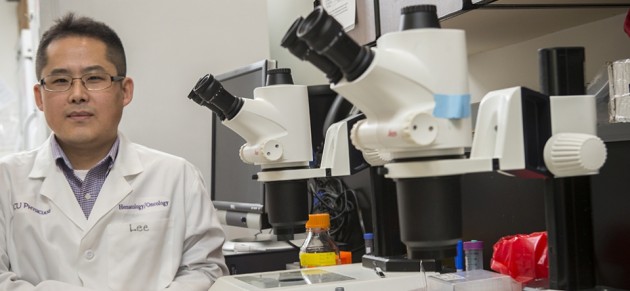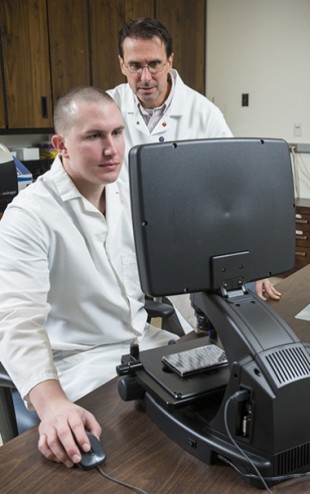Publisher's note: The author of this post, Kathryn Kennedy, is a contributor to ECU News Services.
Private funding supports research to address disease in eastern N.C.
The renewal of a private funding source for research at East Carolina University's Brody School of Medicine will support work related to diseases that most impact the lives of eastern North Carolinians.
Established in 2005, the Brody Brothers funding for research was given annually through 2008. But the endowment lost money during the economic recession, and so the awards were put on hold until 2014 when the investment fully recovered.
"The availability of these funds affords ECU doctors and researchers an opportunity to further study innovative ideas and launch new research," said Hyman Brody, who reviews the proposals with cousin David Brody and a team of researchers from the medical school.
The Brody Brothers Stewardship Committee approved approximately $265,000 this academic year to be divided among seven grant proposals. Research topics to earn funding include cancer, diabetes and cardiac and sickle cell disease.
ECU physiology professor Dr. David Tulis, standing, is assisted in his research by doctoral candidate Andrew Holt. Tulis will apply private funding toward his investigation of how blood vessels are damaged by diabetes.
"There is a lot of quality research going on at the school," remarked David Brody.
"There have been many important contributions to the science and improvement of health generated by our faculty."
The awards range from $32,000 to $45,000. But in an increasingly competitive funding environment, seed grants like these have become essential to attracting larger awards from agencies like the National Institutes of Health (NIH) and the National Science Foundation.
"With many of the major funding mechanisms out there, you get two tries - a submission and a resubmission," said Dr. Bob Lust, interim associate dean for research and graduate studies at Brody.
"There's more pressure than ever before to be as competitive as possible on the first attempt."
Lust said the Brody Brothers grants enable researchers to gather preliminary data, or to explore a new idea in their field.
Dr. Myon-Hee Lee, associate professor of in the Department of Internal Medicine's Hematology/Oncology Division, knows firsthand how seed funding can aid research. Lee applied last year for an NIH grant to support his investigation into how tumors develop and associated therapeutic targets for cancer patients.
By studying systems in the C. elegans worm, Lee's research team identified a key regulator, PUF-8, that suppresses tumor formation. He wants to learn more about how it relates to the organism's regulatory system. The reviewers gave Lee high marks on his proposal, but it wasn't funded.
"I have to generate new data to resubmit," he said.
"And it takes funding to do that."
Lee is hopeful that his resubmission will be successful, and he credits the Brody Brothers grant with enabling him to make a stronger case this time. Brett Keiper, a professor in biochemistry, is a collaborator on the grant.
Another recipient of Brody Brothers funding is Dr. David Tulis, associate professor in the Department of Physiology. His work explores how cyclic nucleotide signaling might control some of the mechanisms that cause damage to blood vessels during diabetes.
"Diabetes is a disease in and of itself, but it's also a risk factor for other major cardiovascular disorders, as well as cancer," Tulis said.
"(This research) holds a lot of promise for our understanding of the vascular complications of diabetes."
It's also a topic that resonates with the Brody family because of the high rates of diabetes in eastern North Carolina.
Tulis is collaborating with Dr. Li Yang, associate professor of hematology/oncology in the Department of Internal Medicine, and Dr. Dean Yamaguchi, vascular surgeon in the Department of Cardiovascular Sciences. Together, the team plans to translate its basic science findings to the clinical setting using tissues from rodents as well as healthy and diabetic individuals.
"If we want to continue to attract these top doctors and researchers, we need to be competitive with funding for this work, and open our pocketbooks and give back," said Hyman Brody.
"The current dollars from this fund are great, but every time we do the grant review many fabulous proposals do not receive funding as there is only so much to go around."
Beginning with a generous gift to East Carolina University to help establish the medical school, the Brody family of Kinston and Greenville has had a long-standing commitment to educating new physicians and improving health care for eastern North Carolina. J. S. "Sammy" Brody and his brother Leo were among the earliest supporters of
medical education in eastern North Carolina.
If you're interested in supporting research at the Brody School of Medicine, contact Kathy Brown at 252-744-6265 or brownka@ecu.edu.

ECU hematology/oncology professor Dr. Myon-Hee Lee, pictured above, will apply private funding to acquire new data for his research on cancerous tumors and how they develop. (Photos by Cliff Hollis)


